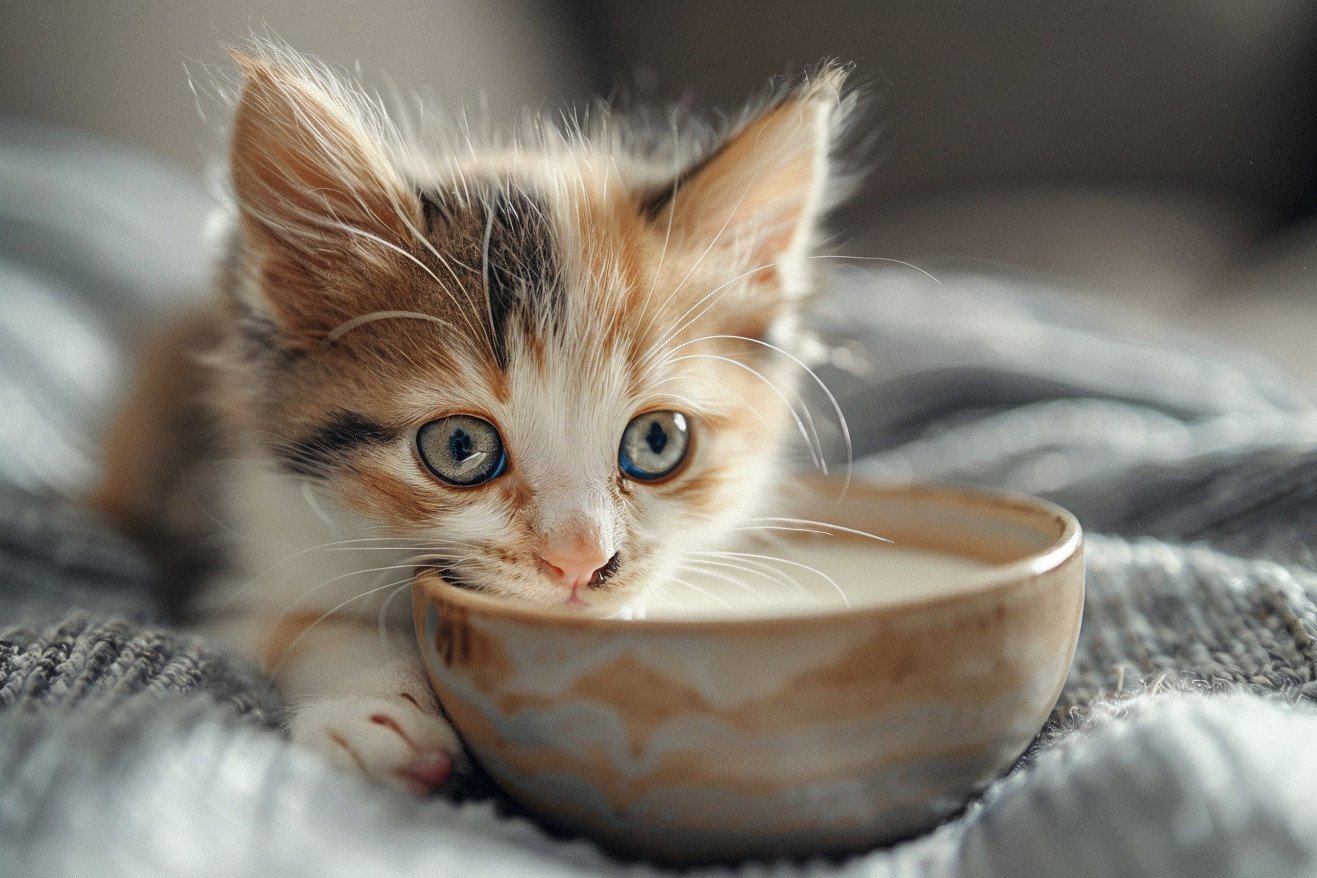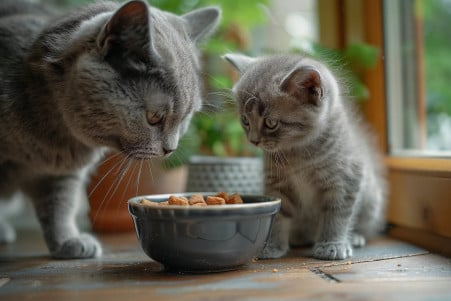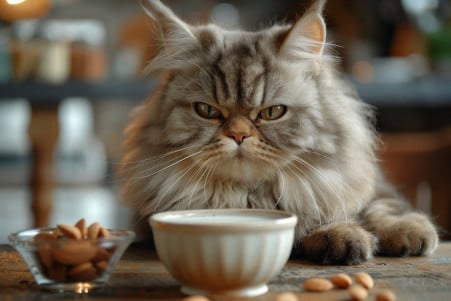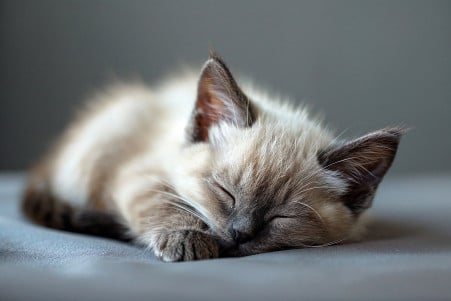How to Dilute Cow's Milk for Kittens: A Step-by-Step Guide
5 June 2024 • Updated 4 June 2024

Although cow's milk is not an ideal option for feeding a kitten, there are ways to dilute and supplement it so that it can be used to help a kitten in need. To safely feed a kitten cow's milk, mix 1 part whole milk with 1 part water and add 1 tsp of tuna oil and 1/2 crushed calcium/vitamin tablet per 8 oz of diluted milk. Feed every 4 hours, warming the mixture slightly.
To give a more in-depth look at how to dilute cow's milk for kittens, we will cover veterinary studies that deal with the nutritional needs of cats and the digestion of lactose. This will help you better understand the differences between cow's milk and cat milk and make sure that your kitten is getting the right amount of hydration, minerals, and supplements. With the help of experts in feline care, you can dilute cow's milk for kittens in a way that will help them in the short term when it's absolutely necessary.
How should cow's milk be diluted for kittens?
Kitten Nutritional Needs and Milk Composition
Kittens require a much higher level of nutrition than adult cats because of their fast growth and development. A mother cat's milk is biologically engineered to meet these needs, so it has higher levels of protein, fat, essential fatty acids like DHA, and higher levels of vitamins and minerals like calcium, phosphorus and vitamin A.
On the other hand, cow's milk is nutritionally different and lacks many of the nutrients found in cat milk. This means that cow's milk is an incomplete replacement and can't meet a kitten's nutritional needs on its own. Commercial kitten milk replacers are made to be nutritionally similar to a queen's milk, so they are a much better option.
It's important to know the differences between cow's milk and cat milk so that you can make sure to supplement and balance a kitten's diet properly when you have to use diluted cow's milk. While cow's milk can be a source of nutrition, it doesn't have the right nutritional content to meet a kitten's increased nutritional needs during this important period of development.
Dangers and Symptoms of Lactose Intolerance in Kittens
Most adult cats are lactose intolerant and cannot properly digest the lactose in cow's milk. According to Catster, this is because most felines lack the necessary enzymes to break down lactose, the sugar found in cow's milk. While kittens are able to digest their mother's milk at first, their ability to digest lactose decreases as they are weaned.
Feeding undiluted cow's milk to kittens can result in severe gastrointestinal distress, including diarrhea, vomiting, and dehydration. Petplan warns that symptoms of lactose intolerance in cats include diarrhea, flatulence, bloating, and general discomfort after consuming milk. If a kitten experiences any of these symptoms, it is important to discontinue feeding cow's milk and seek veterinary care immediately.
It is important to be aware of the dangers of lactose intolerance when deciding whether to use diluted cow's milk as a short-term feeding option for kittens. It is important to closely monitor the kitten and be prepared to switch to a more appropriate milk replacer if necessary to ensure the kitten's safety and comfort.
How to Make and Feed Diluted Cow's Milk to Kittens
To make and feed diluted cow's milk to kittens, start by diluting whole cow's milk with an equal amount of water to lower the lactose content. Kitten Rescue notes that this will help reduce the chances of digestive problems, such as diarrhea and vomiting.
Then, mix in 1 tsp of tuna oil and 1/2 crushed calcium/vitamin tablet for every 8 oz of the diluted milk. This will help make up for the nutrients that are missing from cow's milk. The Spruce Pets suggests warming the formula to about 100°F (38°C) before feeding to help prevent digestive issues.
Kittens will need to be fed this diluted, supplemented cow's milk every 4 hours, with a goal of providing about 8 mL per ounce of the kitten's body weight per day. wikiHow explains that it's important to watch the kitten carefully for signs of lactose intolerance or dehydration, and adjust the feeding schedule accordingly. If you can get the dilution and supplementation right, cow's milk can be used as a stopgap when you can't get your hands on a commercial kitten milk replacer.
How to Wean Kittens Off of Milk
Kittens can start the weaning process at 5-6 weeks old when their teeth start to come in, says Catster. At this point, you can start mixing high-quality wet kitten food with the milk replacer to make a gruel.
The National Kitten Coalition suggests increasing the amount of gruel while decreasing the amount of milk over a two-week period. They also suggest introducing dry kitten kibble, which can be mixed with water or milk replacer at first to make it easier for kittens to eat.
By 8-10 weeks old, kittens should be completely weaned and eating wet kitten food that's been slightly moistened but doesn't have any added liquid, says PetMD. This will help make the weaning process as easy as possible for the kittens and help prevent any digestive issues while still ensuring they get the nutrition they need to grow and develop.
Commercial Kitten Milk Replacers: A Better Option
Commercial kitten milk replacers are made to be as close as possible to a queen's milk, says VCA Animal Hospitals. The best milk replacers, like PetAg KMR and Nutri-Vet, are made with real milk, probiotics, and essential vitamins and minerals.
These milk replacers are made to meet the nutritional needs of kittens, which include higher levels of protein, fat, and calories, according to the VCA Animal Hospitals article. Because of this, using a commercial milk replacer is a better and more complete option than cow's milk. Catster says that when possible, milk replacers should be the first choice for feeding orphaned or rejected kittens.
In contrast to cow's milk, which is diluted and lacks the nutritional profile needed for a kitten's growth and development, commercial formulas offer a more complete and balanced nutritional profile that's tailored to the needs of kittens during this important stage of their lives. With a commercial milk replacer, kittens can get the hydration, minerals, and nutritional supplementation they need.
Conclusion: The Importance of Kitten Nutrition and Health
Catster notes that cow's milk is not good for kittens or cats. Most cats are lactose intolerant, meaning they lack the enzyme lactase, which is needed to digest the sugar lactose, which is found in cow's milk in high amounts. This can cause gastrointestinal issues like diarrhea, vomiting, and dehydration in kittens.
Kittens require a much higher level of nutrition than adult cats to support their growth and development. Purina says that kitten food is higher in calories and has increased levels of important nutrients like protein, fat, calcium, and essential fatty acids. A mother cat's milk is designed to meet these needs, but cow's milk does not have the same nutritional content.
VCA Animal Hospitals says that nutrition is important for a kitten's growth, immune system, and body condition. It's important to feed kittens the right levels of protein, fat, and calcium, as too much or too little of any of these nutrients can lead to problems like obesity and growth issues.
Nutrition is important for a kitten's growth, development, and overall health. Work with a vet to determine the best feeding regimen for your kitten's individual needs.


